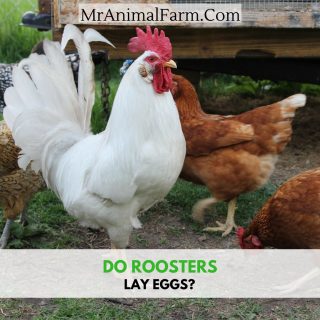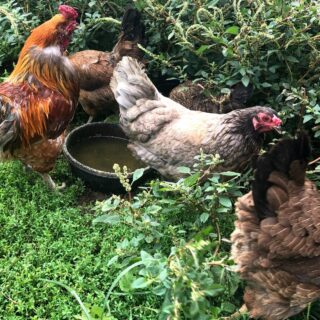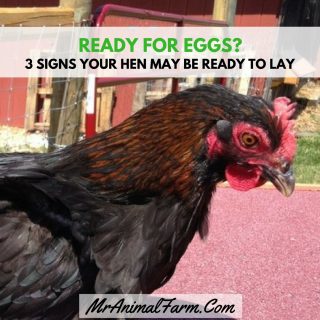We've all seen the videos on Youtube of chickens doing their best duck impression, kicking around in a backyard kiddie swimming pool. We think it's cute too. But, it got us wondering can chickens swim or were these just some unique birds?
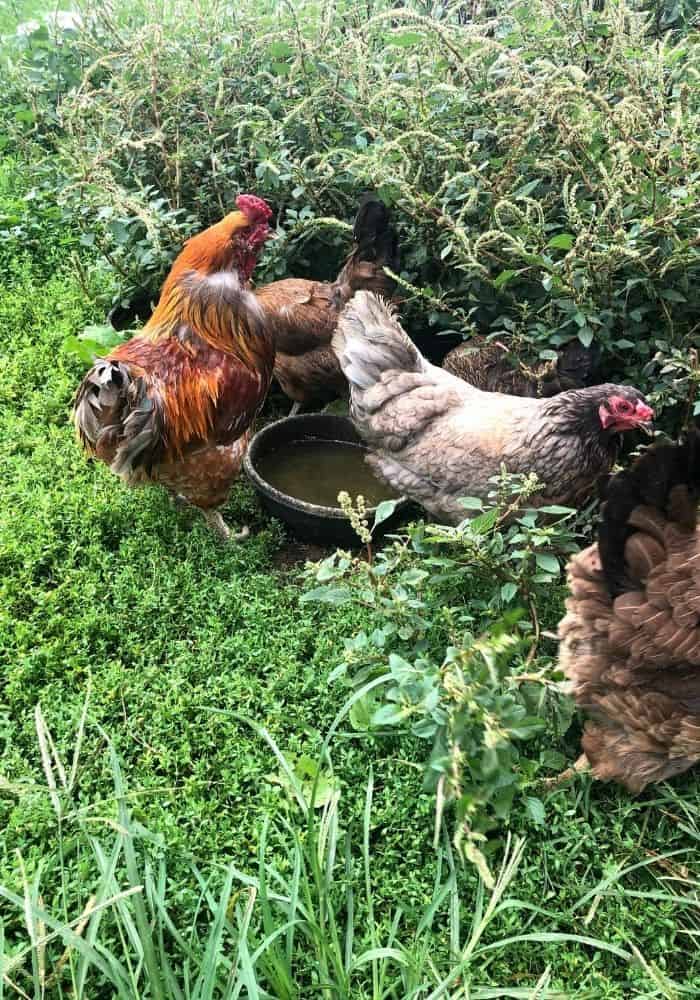
IN THIS ARTICLE
So, Can Chickens Swim?
Are They Built For Swimming?
Ducks Vs Chickens Comparison
Common Questions
1. Do Chickens Like Water?
2. Do Chickens Like Kiddie Pools?
3. Can Chickens Float?
4. Can Chickens Drown?
5. Can Baby Chickens Swim?
6. Can I Spray My Chickens With Water?
7. What Happens If My Chicken Gets Wet?
8. What Do I Do If My Chicken Gets Wet?
8a. How Do I Dry My Chicken?
Conclusion
Before any of use go out and start buying kiddie swimming pools for your chickens, let's look at a few chicken facts first.
So, Can Chickens Swim?
The short, easy answer is yes, chickens can swim. Like most animals (people included) they do have a capacity to keep themselves from drowning when in a body of water. However, if you are expecting them to have the grace of a duck or other waterfowl, you will need to look elsewhere. Chickens lack the body oils needed for waterproof feather and will become saturated with water.
If they do not find dry land soon enough, they will quickly sink and you will have the sight of swimming chickens turning into chickens drowning burnt into your mind's eye forever.
Water Is Not Their Natural Habitat
First of all, water is not where chickens like to be. Chickens prefer an environment in which both feet are firmly on the ground; unless they are flying/flapping away in terror of their own shadow, of course. While there are probably plenty of little crawly things for them to eat, they get a lot of their nutrition and digestion abilities from scratching around on the ground.
Chickens also take what are called "dirt baths". Essentially, they will roll around in a pile of dirt and fluff around for a minute. This is their own form of pest control. The grit is irritating to lice and mites and helps them keep those away.
Since dust is not super prevalent in water, they don't really fit in too well.
They Tend To Panic
"What's the matter? Chicken?"
We've all heard this playground taunt. And it's because chickens are literally terrified of everything; including water. If it is something new to their senses they will freak out.
Drop a chicken in a body of water, especially if they have never been in one before, and they will start squawking and flapping their wings; making a huge commotion.
When they do this, they can easily exhaust themselves, inhale water, become soaked and heavy, etc. Instead of focusing on getting out of the water, they panic and any number of bad things can happen from there. If it's cold water, this can happen even more quickly due to how the body reacts to sudden temperature shocks.
Need some help keeping your chickens health and care taken care of? Check out the Organized Chicken Keeper for an easy to follow system.
Are They Built For Swimming?
The easiest way to answer this question is to look at a bird that IS built for water and swimming; the duck. If you have experience with ducks, you know that raising chickens is very, very different.
For those that do not have duck raising experience, let's compare the two and see how the chicken matches up.
Ducks Vs Chickens Comparison
We won't be too comprehensive. We will look at the two primary differences that affect their swimming abilities.
Feet
If you look at a duck's feet, you immediately know they will be good at swimming. Their webbed feet essentially work like they have a set of paddles attached to their bodies.
Chickens, on the other hand (other wing?), do not have webbed feet. In fact, they only have a few toes with no webbing at all. Unlike ducks, chickens do not have an innate ability to swim and their feet cut right through the water instead of propelling them like a duck's feet.
Size
Aside from ducks having the natural ability to swim, they are also pretty small. Most average sized chickens large bodies, in comparison, and just add to the potential sinking weight once they are submerged.
Why do they sink, you ask?
Feathers
The other big difference between the two is their feather type. It is true that chickens feathers are generally water resistant. If they get wet, the water will usually bead up and they can shake it off. But, if you've ever seen a chicken that didn't make it to the coop in time before a storm, they can get soaked.
Again, unlike ducks, the lack of a "preen gland" makes it more difficult for chickens to swim. A preen gland secretes an oil that ducks will then spread over their feathers. That oil locks out water completely and allows the duck to stay dry and warm.
So, clearly a chicken is not built for the water.
Common Questions
Here are some of the more common questions we came across while researching for this article.
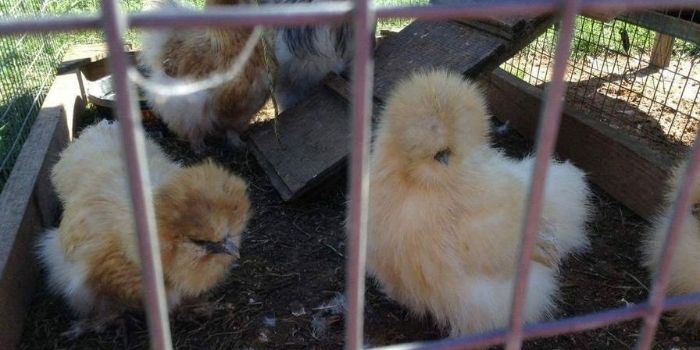
Do Chickens Like Water?
Not really. They need water to drink, but other than that, they don't really care for it.
Do Chickens Like Kiddie Swimming Pools?
Youtube shows us there are some obvious exceptions but, in general, chickens will steer clear of kiddie pools.
If you keep chickens and ducks together, they may explore once they see the ducks swimming. If this is the case, make sure the water is shallow enough for them to stand and that they have some sort of step to get out safely.
This advice is for a small swimming pool filled with hose water. Family style pools are even worse because they are larger and the deep water is hard for a chicken to find a foothold to get out. Additionally, these swimming pools will often have harsh pool chemicals that can be damaging.
Can Chickens Float?
They can. Their feathers are water resistant and can trap air under them as a form of insulation. That's on way to keep chickens warm in the winter time. All that trapped air essentially makes them float like a pool toy (water wings?).
However, this is not completely true for all chickens. Most chickens can float, but some breeds, like Silkies, have fluff instead of normal feathers. Their feathers will become saturated and they will sink.
Can Chickens Drown?
Like just about anything with lungs, if too much water gets into them, they can drown. Even a healthy chicken will have a hard time if they are unable to get out before sinking.
Can Baby Chickens Swim?
No, young chicks will also panic like adult chickens. Plus, they have fluff similar to Silkies that will soak quickly and sink them. Please, keep any body of water away from baby chicks.
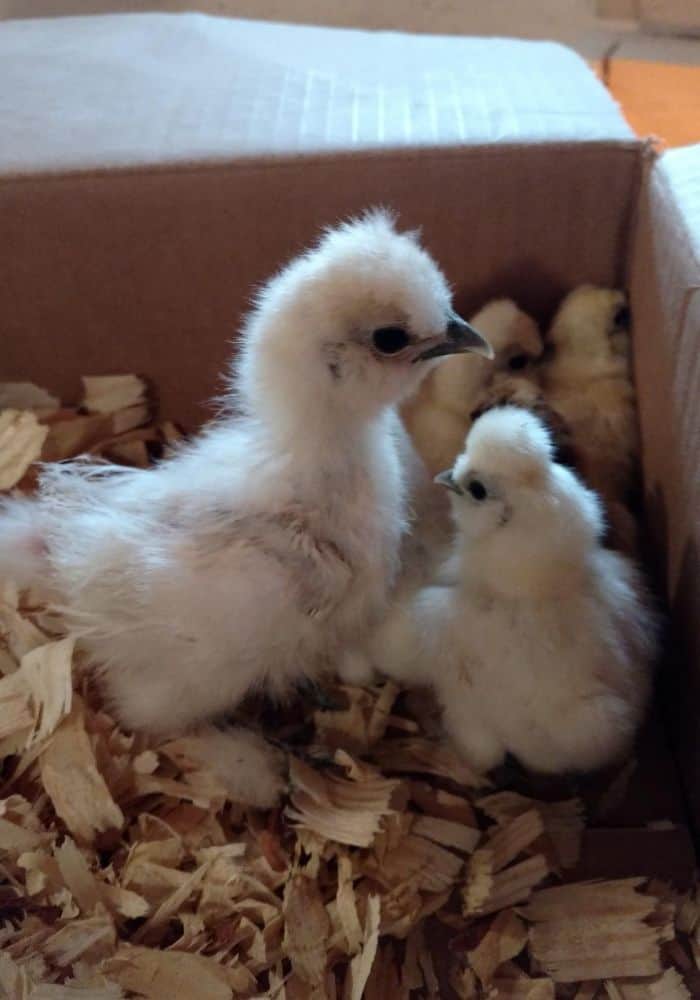
Can I Spray My Chickens With Water?
We're assuming you mean to cool them off and not just for funsies. You can buy misting hoses that chickens can use on their own to cool off. But generally speaking, you should probably not hose them down.
What Happens If My Chicken Gets Wet?
They will start sprouting gremlins (not really). Generally, the water will bead up and they will shake it off. But if they become saturated they can chill and get sick, just like us.
What Do I Do If My Chicken Gets Wet?
For the most part they will shake it off and be fine. If they are soaked and it's warm, they will usually dry in a couple of hours. If it is cold or they seem to be acting like they're miserable, you can help dry them off.
How Do I Dry My Chicken?
The easiest ways to dry a chicken that is wet is to, first, towel dry them and then, second, blow dry them. Use a blow dryer on a low setting and keep it between 6 and 12 inches away from them. You don't want to scorch their skin.
Move the blow dryer often and don't linger in one area for too long as it can burn them. Continue to do this while fanning out their feathers until they are dry.
Conclusion
That's probably more than you ever thought there was to know about chickens swimming. Now we know that chickens can definitely swim, but they don't really like it and it's not always the safest thing for them to do.
But if you happen to have one of those rare chickens that enjoys a nice dip on a warm day, by all means, share in the comments below.
If you need more help with taking care of your chickens, check out The Organized Chicken Keeper for a complete system for managing their health through keeping their supplies stocked and coop clean.

